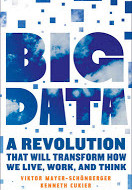
It’s been an exciting spring for big data enthusiasts in the policy analysis community. The cover of the current issue of Foreign Affairs magazine features an article titled “The Rise of Big Data,” authored by two experts whose recent book on the topic asserts that big data is nothing less than a “revolution that will transform how we live, work, and think.” While the article is light on examples of specific ways in which big data might be leveraged to advance U.S. and other governments’ foreign-policymaking priorities, it provides a helpful primer on the subject.
Earlier in the month, meanwhile, as part of its Open Government Initiative, the White House published an executive order designed to unify and improve standards among the large sets of data released by federal agencies. The administration also posted an additional tranche of “previously inaccessible or unmanageable data” with the objective of making it “easily available to entrepreneurs, researchers, and others who can use those files to generate new products and services, build businesses, and create jobs.”

CIA Chief Technology Officer Ira “Gus” Hunt
However, big data is only as useful as what humans can successfully glean from it. Kate Crawford, a Microsoft researcher and visiting professor at MIT’s Center for Civic Media, challenges some of the prevailing notions about the universal merits and immediate utility of big data in a piece at Foreign Policy. She argues, for instance, that a government’s ability to truly glean value from an open data initiative, or from an increased emphasis on new forms of data collection, is limited largely to that “government’s ability to interpret the data and respond with adequate resources”—neither of which are assured.
Here at Praescient, we’re optimistic about the impact that big data stands to have in advancing critical U.S. security and development initiatives. But our work is also firmly rooted in the philosophy that the value of big data can be maximized only when its carefully managed, parsed, and studied by skilled analysts who are equipped with the proper analytic tools (as Jeremy’s post below, on military intelligence efforts in Afghanistan, nicely illustrates).
One of the core objectives of Praescient’s Emerging Opportunities team, therefore, is to seek out emerging technologies and to develop new methodologies that can make the analysis of massive, complex datasets more efficient and productive. Stay tuned for updates here on the team’s progress in the weeks and months ahead.
Post by: Praescient’s Emerging Opportunities Team